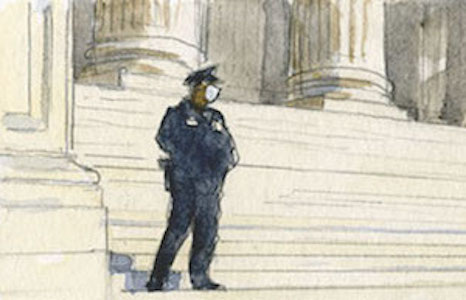Justices clear the way for eighth federal execution this year

The Supreme Court on Thursday night allowed the government to proceed with the execution of Orlando Hall, who became the eighth federal inmate to be put to death since the Trump administration resumed federal executions in July. Hall was sentenced to death for his role in the kidnapping, rape and murder of 16-year-old Lisa Ren in 1994.
In a one-sentence order, the Supreme Court lifted a district judges last-minute injunction that had temporarily blocked Halls execution. Justices Stephen Breyer, Sonia Sotomayor and Elena Kagan dissented and would have left the injunction in place.
The court also rejected three separate emergency requests filed over the past two days in which Hall asked the justices to postpone his execution. There were no noted dissents to the three brief orders rejecting those requests.
Shortly after the court’s orders, Hall was put to death at the federal prison in Terre Haute, Indiana. He died at 11:47 p.m., according to local news reports.
Halls case reached the Supreme Court after a flurry of litigation in the lower courts over the execution, which the government had scheduled for Thursday at 6 p.m. On Thursday afternoon, Judge Tanya Chutkan of the U.S. District Court for the District of Columbia issued an injunction blocking the execution. The injunction was based on an earlier finding from Chutkan that the governments method of execution violates the Federal Food, Drug, and Cosmetic Act because the government uses a lethal dose of sodium pentobarbital without obtaining a prescription for that drug.
The government immediately appealed Chutkans injunction. The government argued that the prescription requirement in the FDCA does not apply to lethal-injection drugs. It also argued that Hall was not entitled to an injunction based solely on the lack of a prescription.
The Supreme Court sided with the government, issuing an order just before 11 p.m. that lifted Chutkans injunction. The majority did not explain its reasoning, and none of the three justices who noted their dissent wrote an opinion explaining why.
At the same time, the court denied Halls three emergency applications, each of which presented separate legal arguments for a postponement of his execution.
In one of his applications, Hall sought a stay of execution so that the court could take up Halls claim that his conviction was tainted by racial discrimination. Hall, a Black man, was convicted by an all-white jury. During jury selection, the prosecution struck four out of five Black prospective jurors. (The defense struck the fifth because of her strong pro-death penalty views.) Lower courts rejected Halls initial appeals based on racial discrimination, but Hall argued to the Supreme Court on Thursday that he has never had the chance to present new evidence of discrimination that emerged after those appeals were exhausted. For instance, one of the prosecutors in Halls case was later found to have unlawfully excluded jurors based on race in Miller-El v. Dretke, which the Supreme Court decided in 2005. The federal government responded on Thursday that Hall could have raised these arguments months or years ago and that his claims were procedurally barred by a federal law that limits federal prisoners from raising multiple claims for relief.
In a separate application, Hall asked the justices to grant a stay of execution so that they could review the merits of Halls claim that the government violated his rights by failing to provide him with sufficient notice of his execution date. On Sept. 30, the Department of Justice scheduled Halls execution to occur on Nov. 19 providing him with 50 days notice. A longstanding federal policy had previously guaranteed inmates at least 90 days notice of an execution date, but the Department of Justice shortened the notice period earlier this year. Hall argued that the shortened notice period, combined with the restrictions associated with the coronavirus pandemic, prevented his attorneys from preparing a proper clemency application and fully exploring paths of judicial relief, effectively denying Halls right to counsel. For instance, his attorneys said they were unable to conduct the extensive fact-finding and in-person interviews necessary to support an adequate clemency application.
Finally, Halls third stay application challenged the federal governments execution protocol on the same grounds that formed the basis for Chutkans Thursday-afternoon injunction. Hall was joined in this application by Brandon Bernard, a federal death row inmate who is scheduled to be executed on Dec. 10. Hall and Bernard argued that the execution protocol violates the FDCA because the protocol allows for the use of pentobarbital without a prescription. And they argued that pentobarbital is highly likely to cause severe and gratuitous pain if not paired with a widely available pain-relieving drug.
Halls case was the first case involving a pending execution in which Justice Amy Coney Barrett participated since she joined the bench in October. Barrett, a devout Catholic, co-wrote a 1998 article on the moral and legal dilemma that Catholic judges face in capital cases due to the churchs opposition to capital punishment. That article raised questions in her confirmation hearings about possible recusals from such cases. Barrett cited her full participation in capital cases as a law clerk for Justice Antonin Scalia and as a judge on the U.S. Court of Appeals for the 7th Circuit.
Halls execution is the eighth since the government resumed carrying out the death penalty this summer after a 17-year hiatus on federal executions. According to the Death Penalty Information Center, it is the first time since 1889 that the federal government has carried out an execution during the lame-duck period between a presidential election and the inauguration of a new president. The government has scheduled two other federal executions before the end of the year: Lisa Montgomery on Dec. 8 and Bernard on Dec. 10.
Posted in Capital cases
Cases: Hall v. Barr, Hall v. Watson, Hall v. Barr, Barr v. Hall, Hall v. Watson, Hall v. Barr
